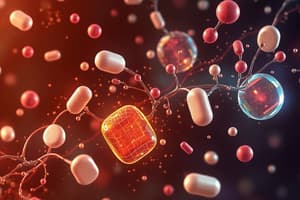Podcast
Questions and Answers
What is a common toxic effect associated with aliskiren?
What is a common toxic effect associated with aliskiren?
- Hyperkalemia (correct)
- Sedation
- Cough
- Renal impairment
Which of the following are considered teratogenic?
Which of the following are considered teratogenic?
- Clonidine
- Methyldopa
- Aliskiren (correct)
- Losartan (correct)
What is the primary mechanism of action for angiotensin receptor blockers (ARBs)?
What is the primary mechanism of action for angiotensin receptor blockers (ARBs)?
- Block AT1 angiotensin receptors (correct)
- Increase bradykinin levels
- Inhibit renin activity
- Activate α2 adrenoceptors
Which disease is treated with centrally acting sympathoplegics like clonidine?
Which disease is treated with centrally acting sympathoplegics like clonidine?
What is a notable side effect of methyldopa?
What is a notable side effect of methyldopa?
Which medication does not typically increase bradykinin levels?
Which medication does not typically increase bradykinin levels?
Which of the following statements is true regarding the toxicity of ARBs?
Which of the following statements is true regarding the toxicity of ARBs?
Which of the following effects is NOT reduced by centrally acting sympathoplegics?
Which of the following effects is NOT reduced by centrally acting sympathoplegics?
What type of transporter does reserpine block in noradrenergic nerves?
What type of transporter does reserpine block in noradrenergic nerves?
What is a potential toxicity associated with reserpine?
What is a potential toxicity associated with reserpine?
Which drug is used to replace norepinephrine in vesicles?
Which drug is used to replace norepinephrine in vesicles?
What condition is primarily treated with α blockers such as prazosin?
What condition is primarily treated with α blockers such as prazosin?
What is a side effect of terazosin?
What is a side effect of terazosin?
Which β blocker selectively blocks β1 receptors?
Which β blocker selectively blocks β1 receptors?
What effect does guanadrel have on norepinephrine?
What effect does guanadrel have on norepinephrine?
Which of the following drugs is indicated for hypertension management?
Which of the following drugs is indicated for hypertension management?
Which of the following drugs is a nonselective beta blocker?
Which of the following drugs is a nonselective beta blocker?
What effect do dihydropyridines like nifedipine primarily have?
What effect do dihydropyridines like nifedipine primarily have?
What is the main action of verapamil and diltiazem?
What is the main action of verapamil and diltiazem?
What type of vasodilation does hydralazine induce?
What type of vasodilation does hydralazine induce?
Which drug is known for causing hypertrichosis as a side effect?
Which drug is known for causing hypertrichosis as a side effect?
What is an important adverse effect associated with hydralazine?
What is an important adverse effect associated with hydralazine?
Which agent is classified as a parenteral vasodilator?
Which agent is classified as a parenteral vasodilator?
What is the primary mechanism of action of nitroprusside?
What is the primary mechanism of action of nitroprusside?
What is the primary mechanism of action of thiazide diuretics?
What is the primary mechanism of action of thiazide diuretics?
Which statement correctly describes the effects of loop diuretics?
Which statement correctly describes the effects of loop diuretics?
What is a common clinical application of spironolactone?
What is a common clinical application of spironolactone?
Which of the following is a known toxicity associated with ACE inhibitors?
Which of the following is a known toxicity associated with ACE inhibitors?
What therapeutic effects do ACE inhibitors provide?
What therapeutic effects do ACE inhibitors provide?
Which pharmacokinetic property is most associated with ACE inhibitors?
Which pharmacokinetic property is most associated with ACE inhibitors?
What is the potential effect of blocking the aldosterone receptor with spironolactone?
What is the potential effect of blocking the aldosterone receptor with spironolactone?
In which condition are thiazides typically used as a treatment?
In which condition are thiazides typically used as a treatment?
Flashcards are hidden until you start studying
Study Notes
Diuretics
- Thiazides (Hydrochlorothiazide, Chlorthalidone): Block Na/Cl transporter in distal convoluted tubule, reducing blood volume and exhibiting vascular effects.
- Loop Diuretics (Furosemide): Block Na/K/2Cl transporter in the loop of Henle, offering higher efficacy compared to thiazides, used for severe hypertension and heart failure.
- Potassium-Sparing Diuretics (Spironolactone, Eplerenone): Block aldosterone receptors, leading to increased sodium excretion and decreased potassium loss, important for conditions like aldosteronism and heart failure.
Angiotensin-Converting Enzyme (ACE) Inhibitors
- Captopril and Others: Inhibit angiotensin-converting enzyme, reducing angiotensin II, vasoconstriction, and aldosterone secretion, significant in managing hypertension and heart failure.
- Side Effects: Cough, angioedema, hyperkalemia, renal impairment, and teratogenic effects.
Angiotensin Receptor Blockers (ARBs)
- Losartan and Others: Block AT1 angiotensin receptors, mimicking effects of ACE inhibitors without increasing bradykinin, used for hypertension and heart failure.
- Side Effects: Similar to ACE inhibitors but with reduced incidence of cough.
Renin Inhibitor
- Aliskiren: Directly inhibits renin, thereby reducing angiotensin I, II, and aldosterone levels, effective for hypertension.
- Side Effects: Hyperkalemia, renal impairment, and potential teratogenic effects.
Sympathoplegics, Centrally Acting
- Clonidine: Activates α2 adrenoceptors to reduce central sympathetic outflow and norepinephrine release, indicated for hypertension and drug withdrawal.
- Methyldopa: Similar mechanism as clonidine with added use in pregnancy but can cause sedation and hemolytic anemia.
Sympathetic Nerve Terminal Blockers
- Reserpine: Blocks amine transporter in noradrenergic nerves, leading to depletion of neurotransmitter stores and reduced sympathetic cardiovascular effects; seldom used for hypertension due to psychiatric side effects.
- Guanethidine and Guanadrel: Interfere with norepinephrine release, leading to similar effects as reserpine, but can cause severe orthostatic hypotension.
Alpha Blockers
- Prazosin, Terazosin, Doxazosin: Selectively block α1 adrenoceptors, prevent vasoconstriction, and reduce prostatic smooth muscle tone, used for hypertension and benign prostatic hyperplasia.
- Side Effects: Orthostatic hypotension.
Beta Blockers
- Metoprolol and Others: Primarily block β1 receptors to reduce heart stimulation and renin secretion; carvedilol also blocks α receptors and nebivolol enhances nitric oxide release.
- Clinical Uses: Hypertension, heart failure, and coronary disease.
Vasodilators
- Calcium Channel Blockers (Verapamil, Diltiazem): Nonselective blockers that reduce heart rate and vascular resistance; used for hypertension and arrhythmias.
- Dihydropyridines (Nifedipine, Amlodipine): Preferentially block vascular calcium channels to reduce vascular resistance; indicated for hypertension and angina.
- Hydralazine: Causes nitric oxide release leading to vasodilation; important for hypertension management but can cause lupus-like syndrome.
- Minoxidil: Opens potassium channels in vascular smooth muscle, reducing vascular resistance, also used for hair loss but can cause hypertrichosis.
Parenteral Agents
- Nitroprusside: Releases nitric oxide, providing powerful vasodilation, primarily utilized in hypertensive emergencies.
Studying That Suits You
Use AI to generate personalized quizzes and flashcards to suit your learning preferences.




